Watch our Executive Director Chris Coulter at the Munich Security Conference!
Watch our Executive Director at #MSC2026!
Our Library
Explore our publications, from research papers and series to educational materials, covering all aspects of conflict transformation and peace promotion.
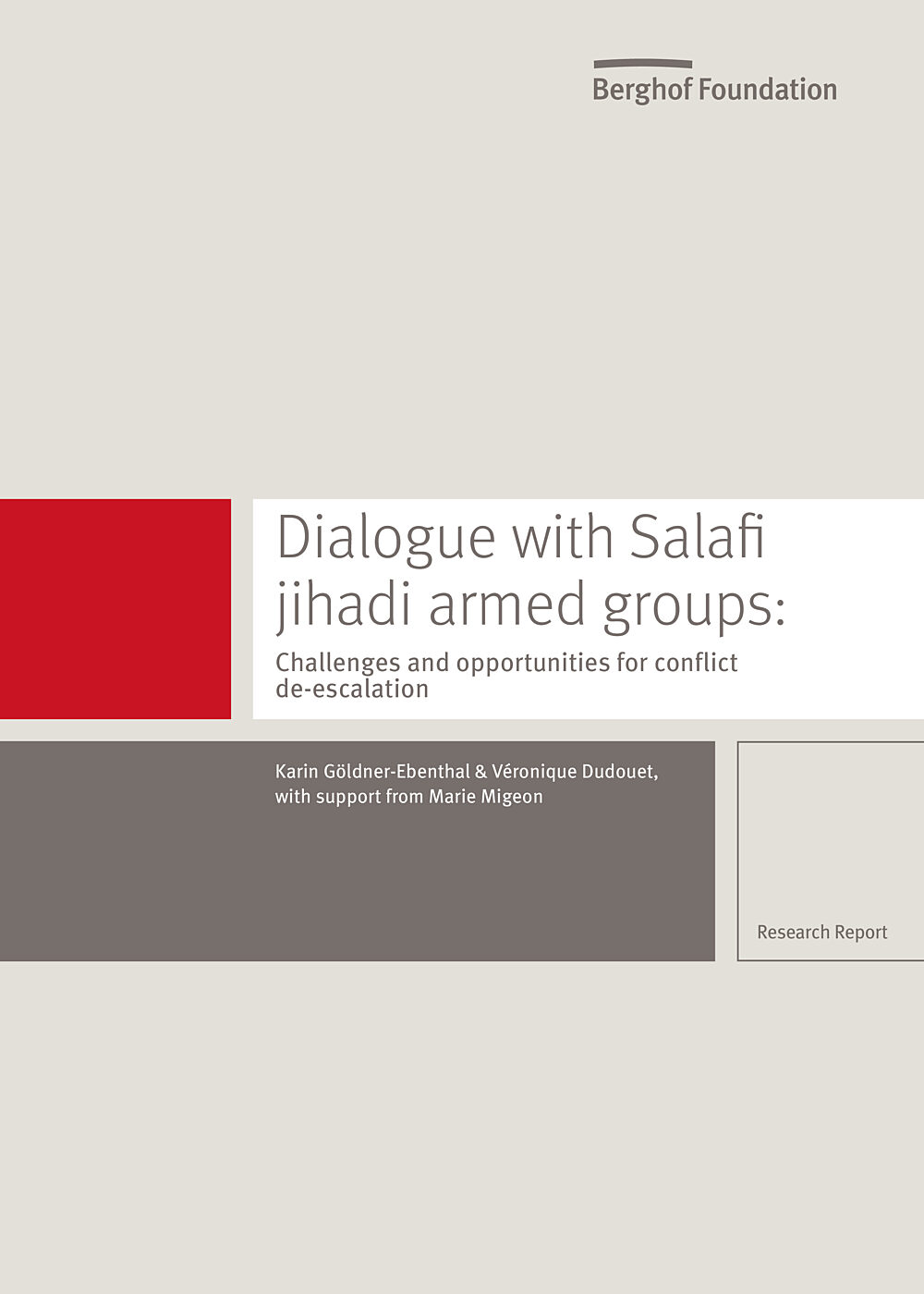
Dialogue with Salafi jihadi armed groupsChallenges and opportunities for conflict de-escalation
In some of the most intense ongoing armed conflicts (Syria, Iraq, Afghanistan, Somalia and Nigeria, to name a few), violent state challengers are characterised by their radical religious beliefs rooted in Salafi-based Islamism.
To better understand possible pathways to violence de-escalation or conflict transformation in such contexts, one needs to analyse the behavioural, ideological and organisational patterns of Salafi jihadi armed groups (SJAGs).
- Year2019
- Author(s)Karin Göldner-Ebenthal, Véronique Dudouet, Marie Migeon
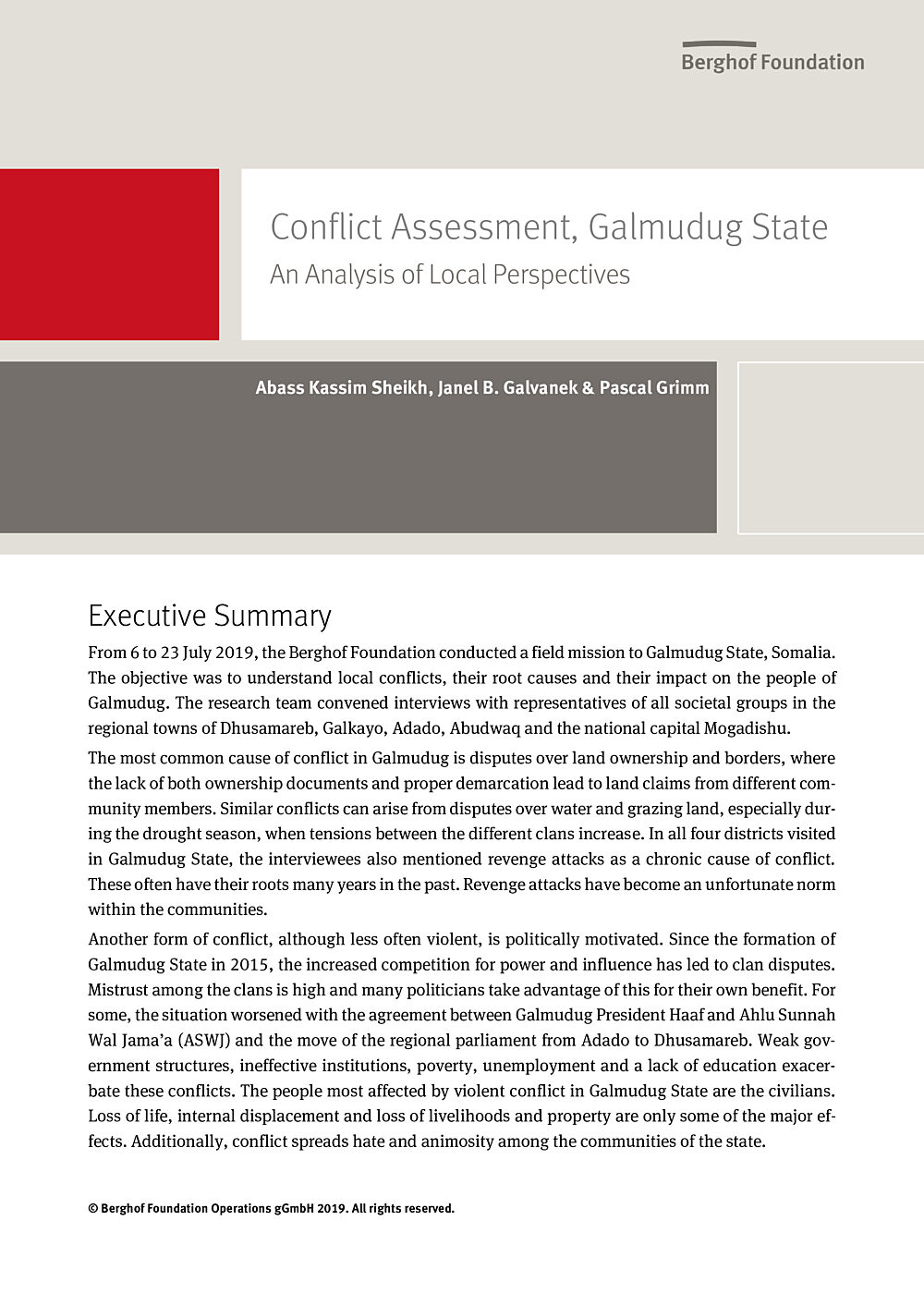
Conflict Assessment, Galmudug StateAn Analysis of Local Perspectives
This study investigated the nature and dynamics of conflicts in Galmudug State. The assessment examined the various conflicts that exist in the state and the key actors that play a central role in these conflicts. The assessment also examined the conflict resolution mechanisms that are used to resolve local conflicts in Galmudug State, and the actors that play an important role in conflict resolution and reconciliation processes. Furthermore, we examined opinions and attitudes on topics such as federal-ism, the 4.5 system and overall political participation in Galmudug State. Lastly, the study investigated the various challenges to conflict resolution and reconciliation processes as well as the urgent needs of the citizens of Galmudug State with regard to peace and conflict.
- Year2019
- Author(s)Janel B. Galvanek, Pascal Grimm
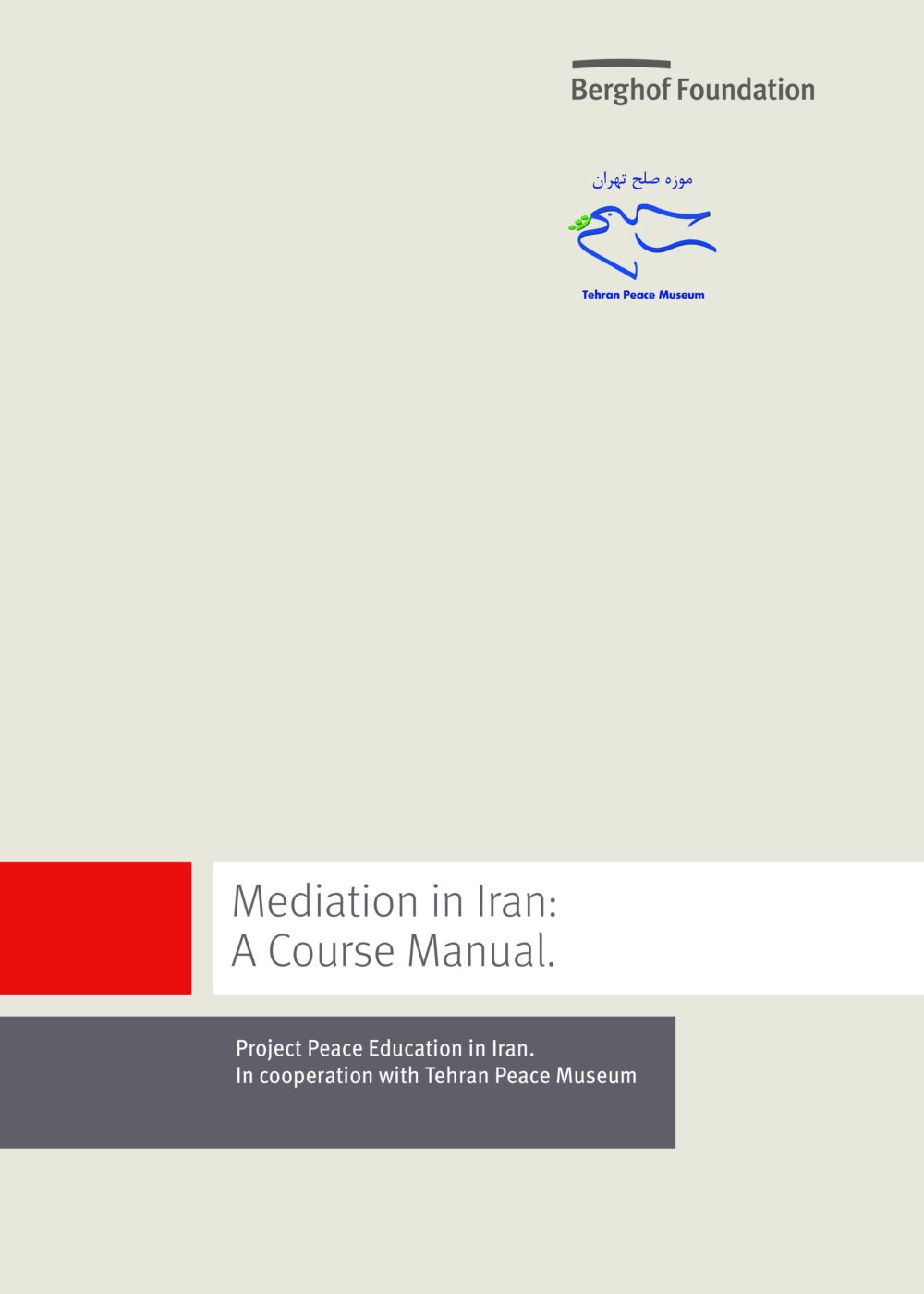
Mediation in Iran: A Course Manual.Project Peace Education in Iran. In cooperation with Tehran Peace Museum
Dealing with conflict in a constructive way as an inseparable part of life requires different tools and each country and community has come up with different methods for that. Traditional mediation has been used as such a tool in Iran for hundreds of years. The Berghof Foundation's Peace Education and Global Learning Programme and the Tehran Peace Museum (TPM) have developed a qualification course on mediation. The manual is available for free download here in English and Farsi and contains an overview of the mediation approach adapted to the Iranian context. The manual includes an overview of different personal conflict styles, gives an insight into conflict escalation and de-escalation, and the purpose of conflict analysis. It introduces the mediation approach, its principles and characteristics, and shows how mediation can be used in different phases of conflict. It also focuses on and the characteristics, competencies, skills and roles of a mediator. And it connects the mediation approach with experiences from Iran, especially in the field of insider and faith-based mediators.
- Year2019
- Author(s)Cora Bieß, Uli Jäger, Isabella M. Bauer, Yalda Khosravi, Neda Pouryekta, Eva Sodeik-Zecha
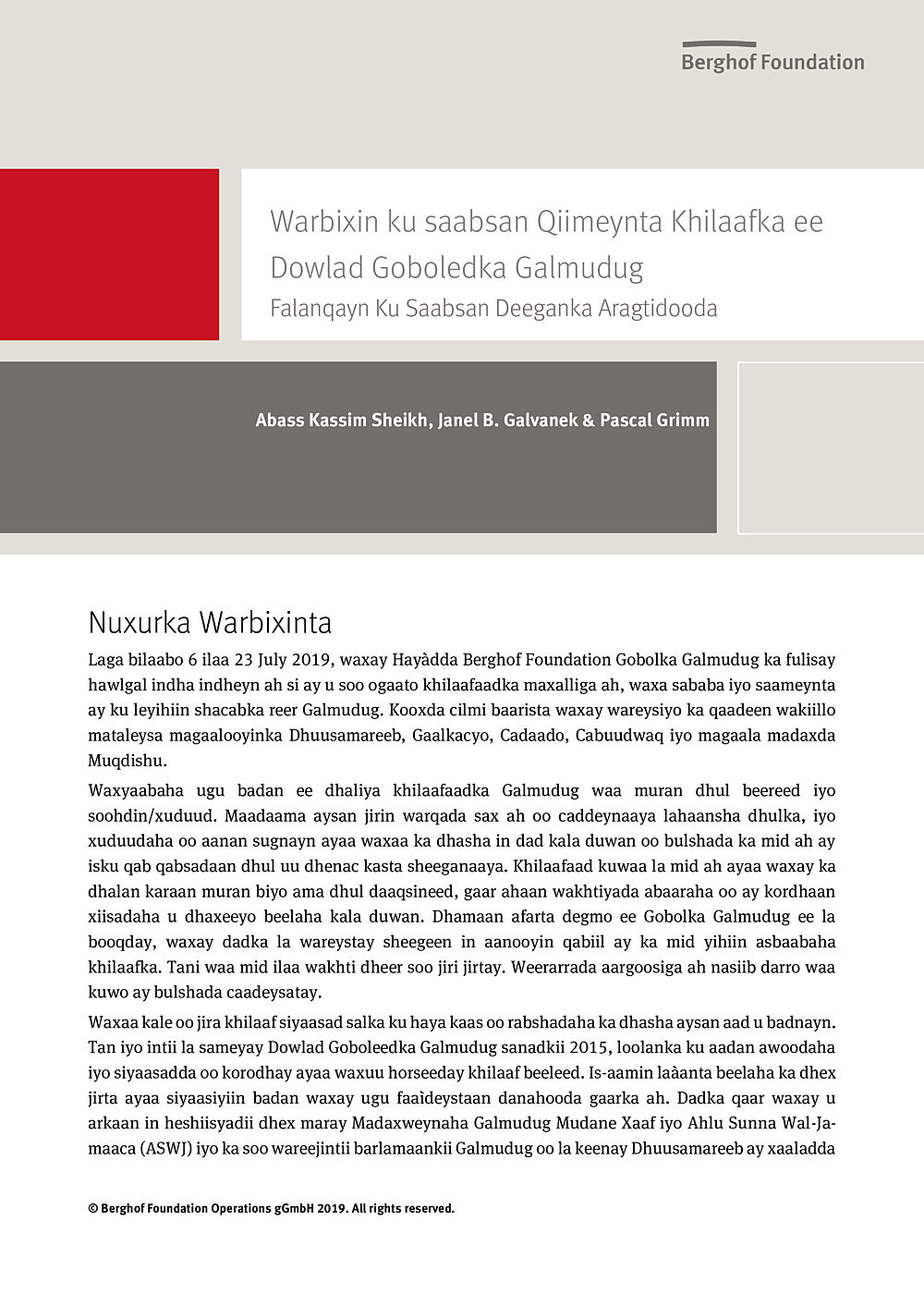
Warbixin ku saabsan Qiimeynta Khilaafka ee Dowlad Goboledka GalmudugFalanqayn Ku Saabsan Deeganka Aragtidooda
Daraasadaan waxay baaris ku sameysay nooca iyo habka is rogrogidda khilaafaadka Galmudug. Qiimeyntu waxay baartay khilaafaad kala duwan oo gobolka ka dhex jira iyo jilayaasha doorka ugu muhiimsan. Waxaa kale oo ay qiimeyntu baartay habkii horay khilaafka Galmudug loogu xallin jiray, iyo jilayaasha doorka muhiimka ah ka ciyaara xallinta khilaafka iyo geedi-socodka dib u heshiisiinta. Intaa waxaa dheer in aan baarnay fikrada iyo aragtiyo ay ka mid yihiin federaal, nidaamka 4.5 iyo guud ahaan ka qeybgalka siyaasadda Galmudug. Ugu dambeyntii, daraasadaan waxay baartay caqabada kala duwan oo ku gudban xallinta khilaafka iyo geedi-socodka dib u heshiisiinta, iyo sidoo kale, baahida deg degga ah ee uu shacabka reer Galmudug qabo markii loo eego nabad iyo khilaaf.
- Year2019
- Author(s)Janel B. Galvanek, Pascal Grimm
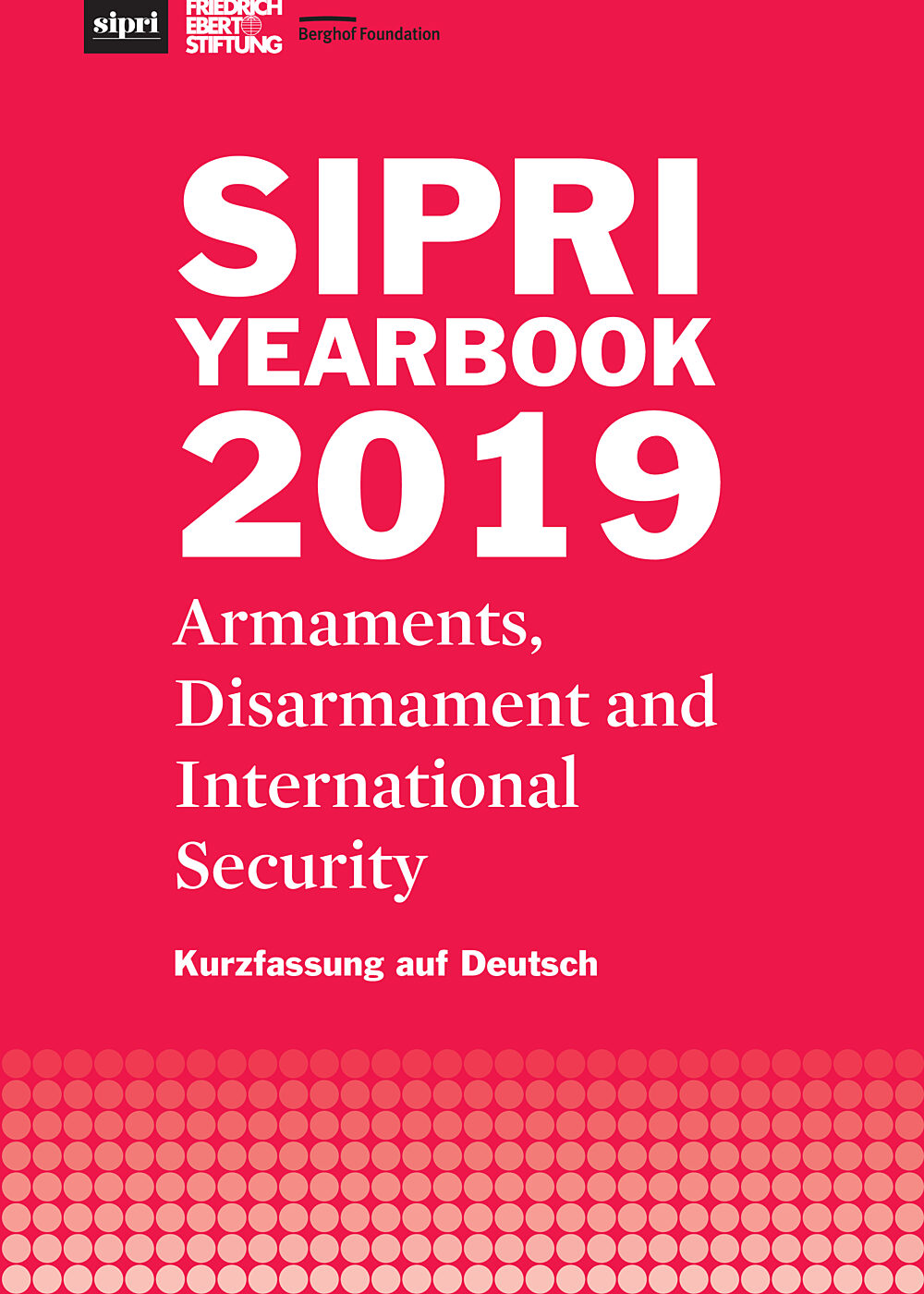
SIPRI Yearbook 2019Armaments, Disarmaments and International Security (Kurzfassung auf Deutsch)
Das SIPRI Yearbook 2019 verbindet Originaldaten aus Bereichen wie weltweiten Militärausgaben, internationalen Waffentransfers, Rüstungsproduktion, Nuklearstreitkräften, bewaffneten Konflikten und multilateralen Friedenseinsätzen mit aktuellen Analysen wichtiger Aspekte der Rüstungskontrolle, des Friedens und der internationalen Sicherheit. Diese Broschüre fasst den Inhalt des SIPRI Yearbook 2019 zusammen und bietet eine Auswahl der darin enthaltenen Daten und Analysen.
- Year2019
- Author(s)Stockholm International Peace Research Institute (SIPRI)
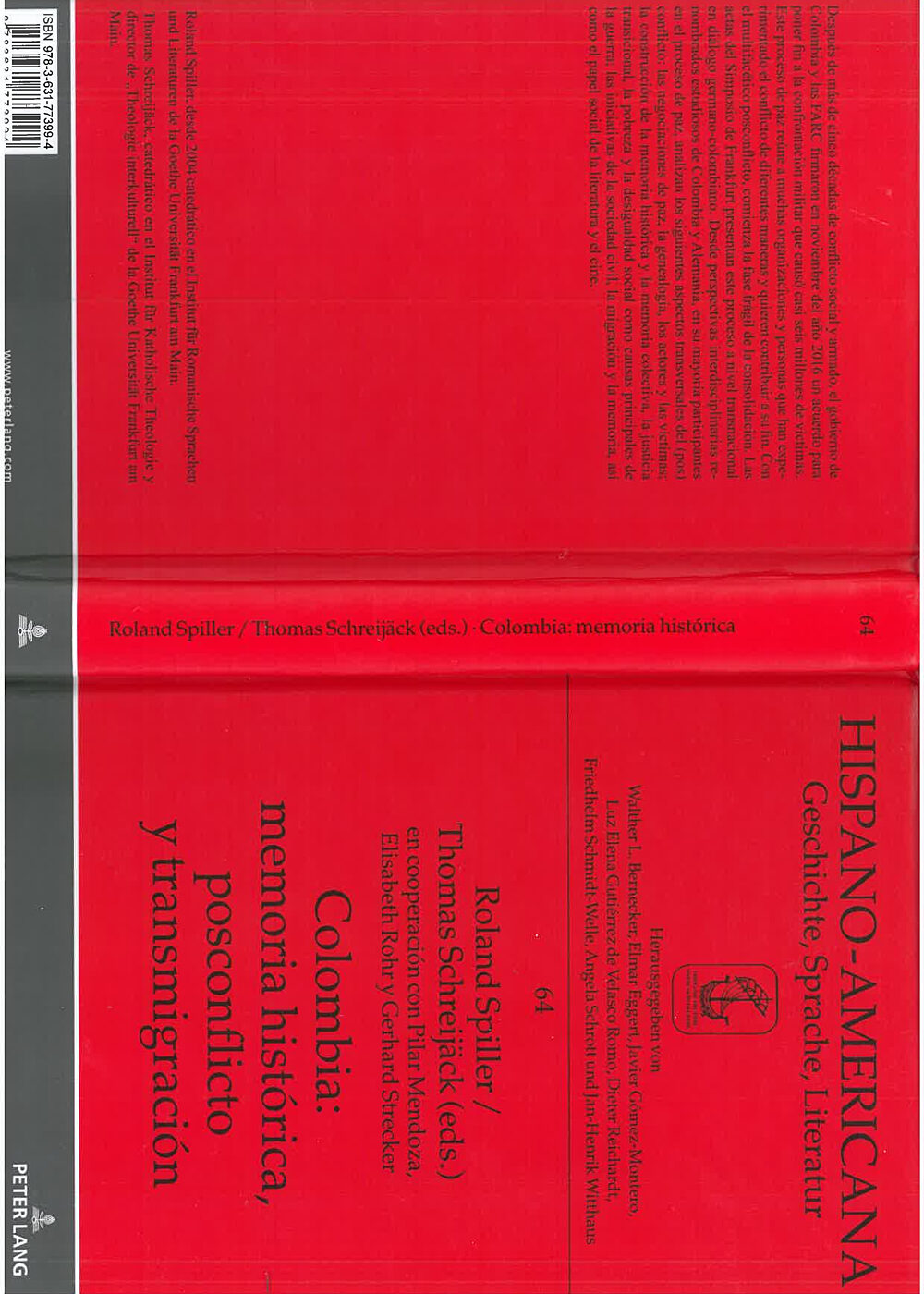
"Insistimos en la paz"Roles, retos y oportunidades de la sociedad civil colombiana e internacional en el proceso de paz en Colombia
From a practitioners' view, the article analyses Colombian civil society's role in the peace process against general functions of civil society, especially in peace processes. Colombia's vibrant and diverse organizations play different and potentially complementary roles, while reflecting the country's dividing lines along levels, regions, and ideology. In Berghof Foundation's conflict transformation work, civil society actors co-shape, even in less visible roles than other sectors, various elements of the peace process acting, among other roles, as watchdogs, incubators for democracy, intermediators, dialogue practitioners, and in peace infrastructures.
- Year2019
- Author(s)Barbara Unger
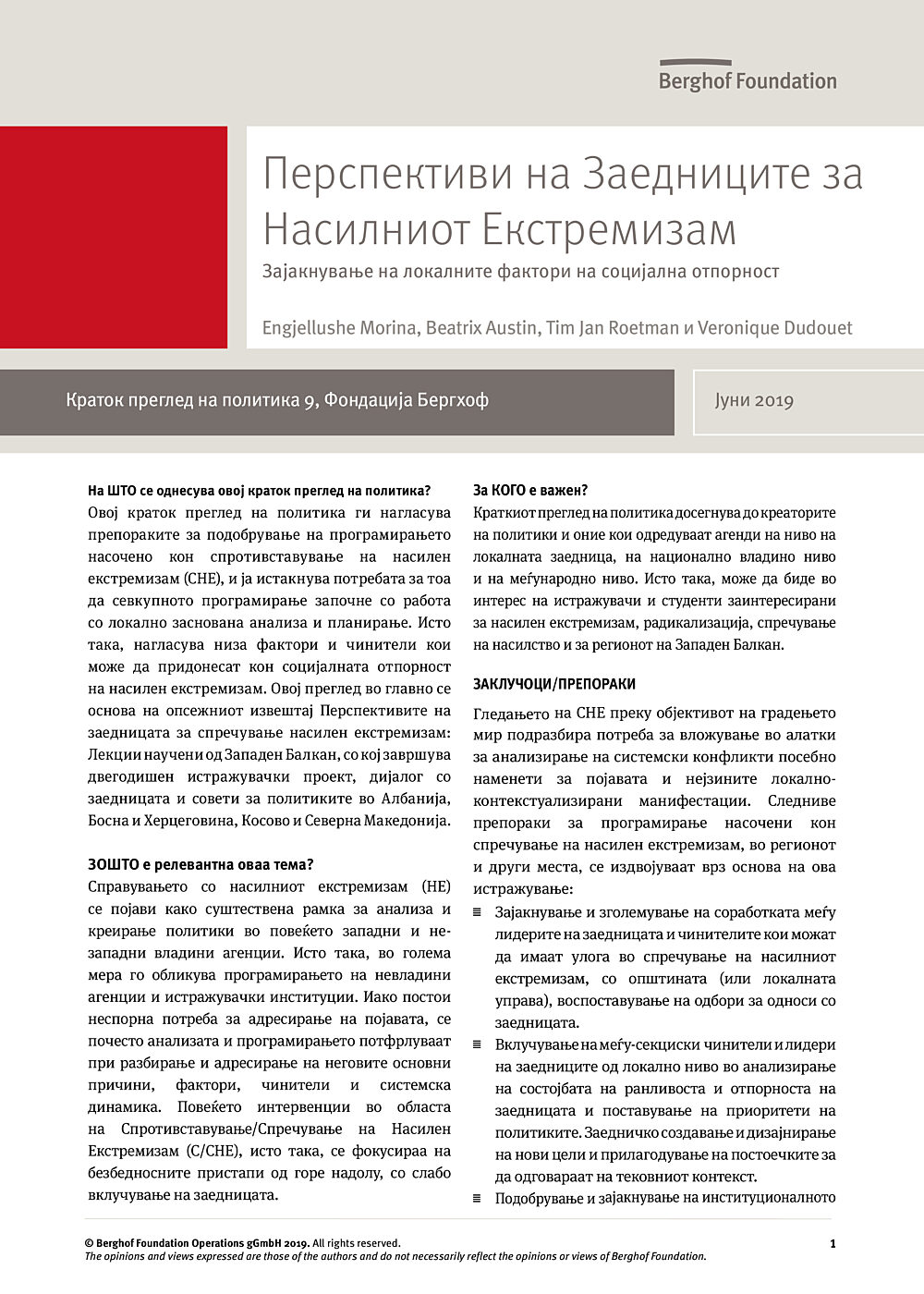
Перспективи на Заедниците за Насилниот ЕкстремизамЗајакнување на локалните фактори на социјална отпорност
Овој краток преглед на политика ги нагласува препораките за подобрување на програмирањето насочено кон спротивставување на насилен екстремизам (СНЕ), и ја истакнува потребата за тоа да севкупното програмирање започне со работа со локално заснована анализа и планирање. Исто така, нагласува низа фактори и чинители кои може да придонесат кон социјалната отпорност на насилен екстремизам. Овој преглед во главно се основа на опсежниот извештај Перспективите на заедницата за спречување насилен екстремизам: Лекции научени од Западен Балкан, со кој завршува двегодишен истражувачки проект, дијалог со заедницата и совети за политиките во Албанија, Босна и Херцеговина, Косово и Северна Македонија.
- Year2019
- Author(s)Engjellushe Morina, Beatrix Austin, Véronique Dudouet, Tim Jan Roetman
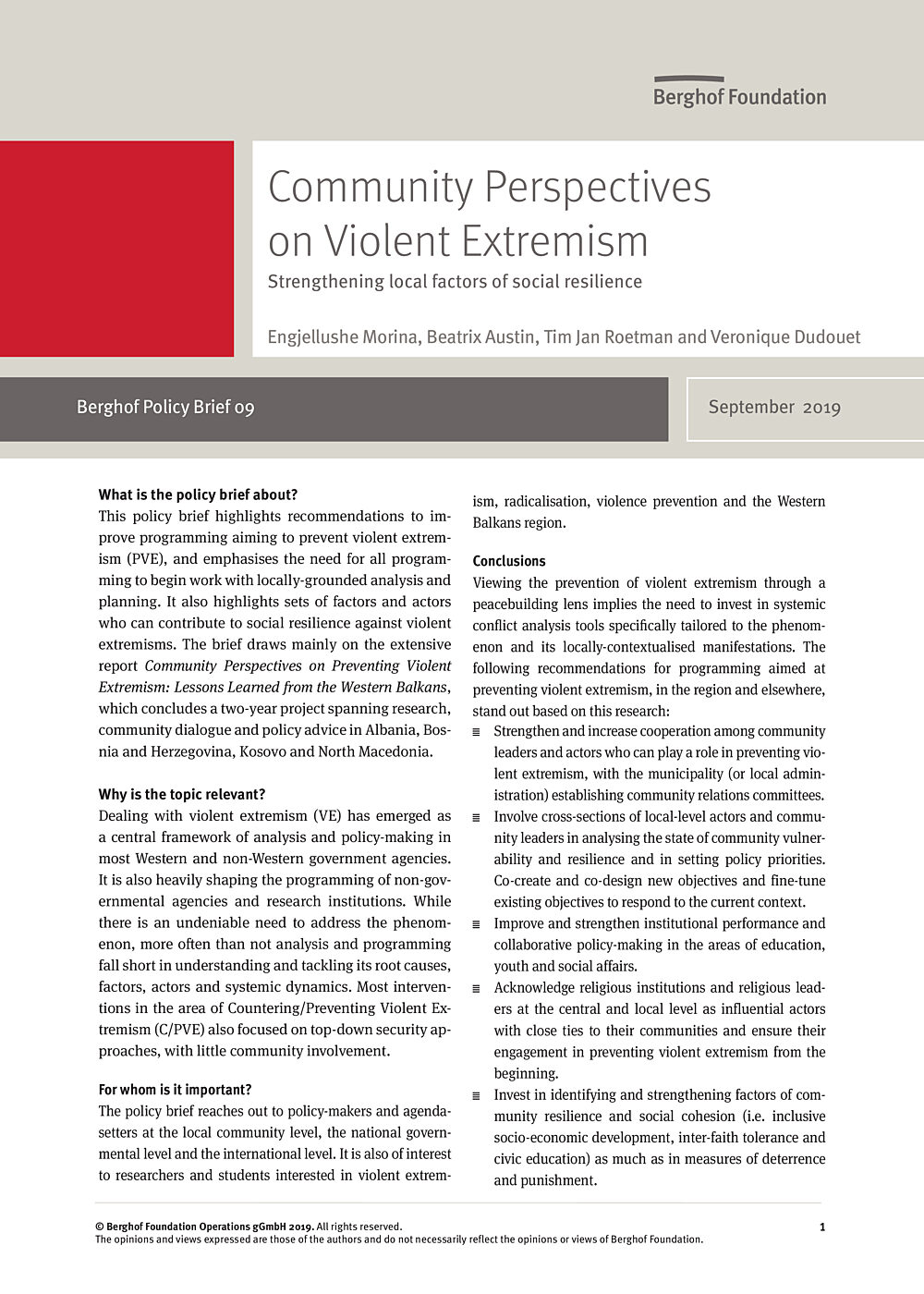
Community Perspectives on Violent Extremism: Strengthening local factors of social resiliencePolicy brief No. 9
Dealing with violent extremism (VE) has emerged as a central framework of analysis and policy-making in most Western and non-Western government agencies. It is also heavily shaping the programming of non-governmental agencies and research institutions. While there is an undeniable need to address the phenomenon, more often than not analysis and programming fall short in understanding and tackling its root causes, factors, actors and systemic dynamics.
- Year2019
- Author(s)Engjellushe Morina, Beatrix Austin, Véronique Dudouet, Tim Jan Roetman
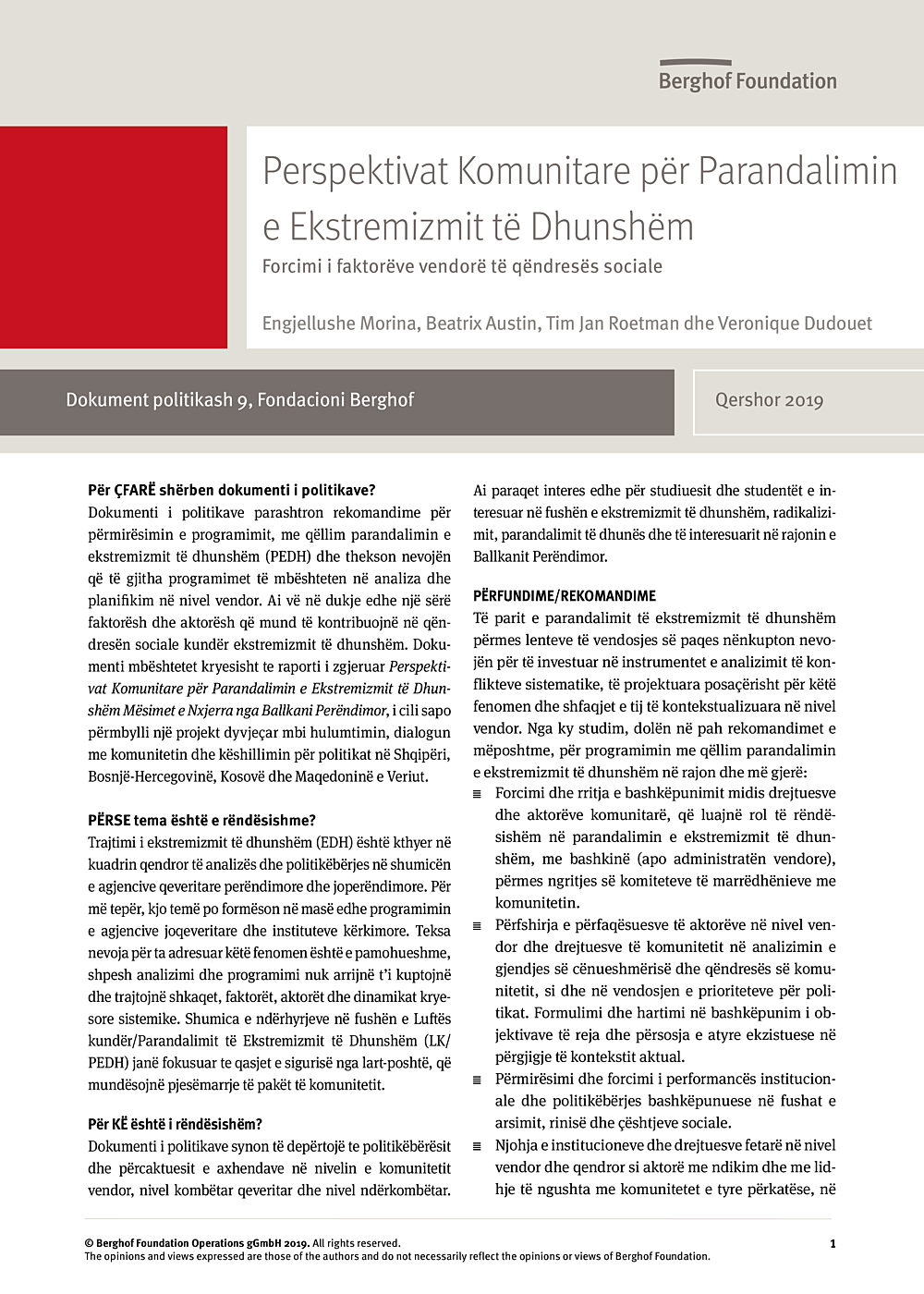
Perspektivat Komunitare për Parandalimin e Ekstremizmit të DhunshëmForcimi i faktorëve vendorë të qëndresës sociale
Dokumenti i politikave parashtron rekomandime për përmirësimin e programimit, me qëllim parandalimin e ekstremizmit të dhunshëm (PEDH) dhe thekson nevojën që të gjitha programimet të mbështeten në analiza dhe planifikim në nivel vendor. Ai vë në dukje edhe një sërë faktorësh dhe aktorësh që mund të kontribuojnë në qëndresën sociale kundër ekstremizmit të dhunshëm. Dokumenti mbështetet kryesisht te raporti i zgjeruar Perspektivat Komunitare për Parandalimin e Ekstremizmit të Dhunshëm Mësimet e Nxjerra nga Ballkani Perëndimor, i cili sapo përmbylli një projekt dyvjeçar mbi hulumtimin, dialogun me komunitetin dhe këshillimin për politikat në Shqipëri, Bosnjë-Hercegovinë, Kosovë dhe Maqedoninë e Veriut.
- Year2019
- Author(s)Engjellushe Morina, Beatrix Austin, Véronique Dudouet, Tim Jan Roetman
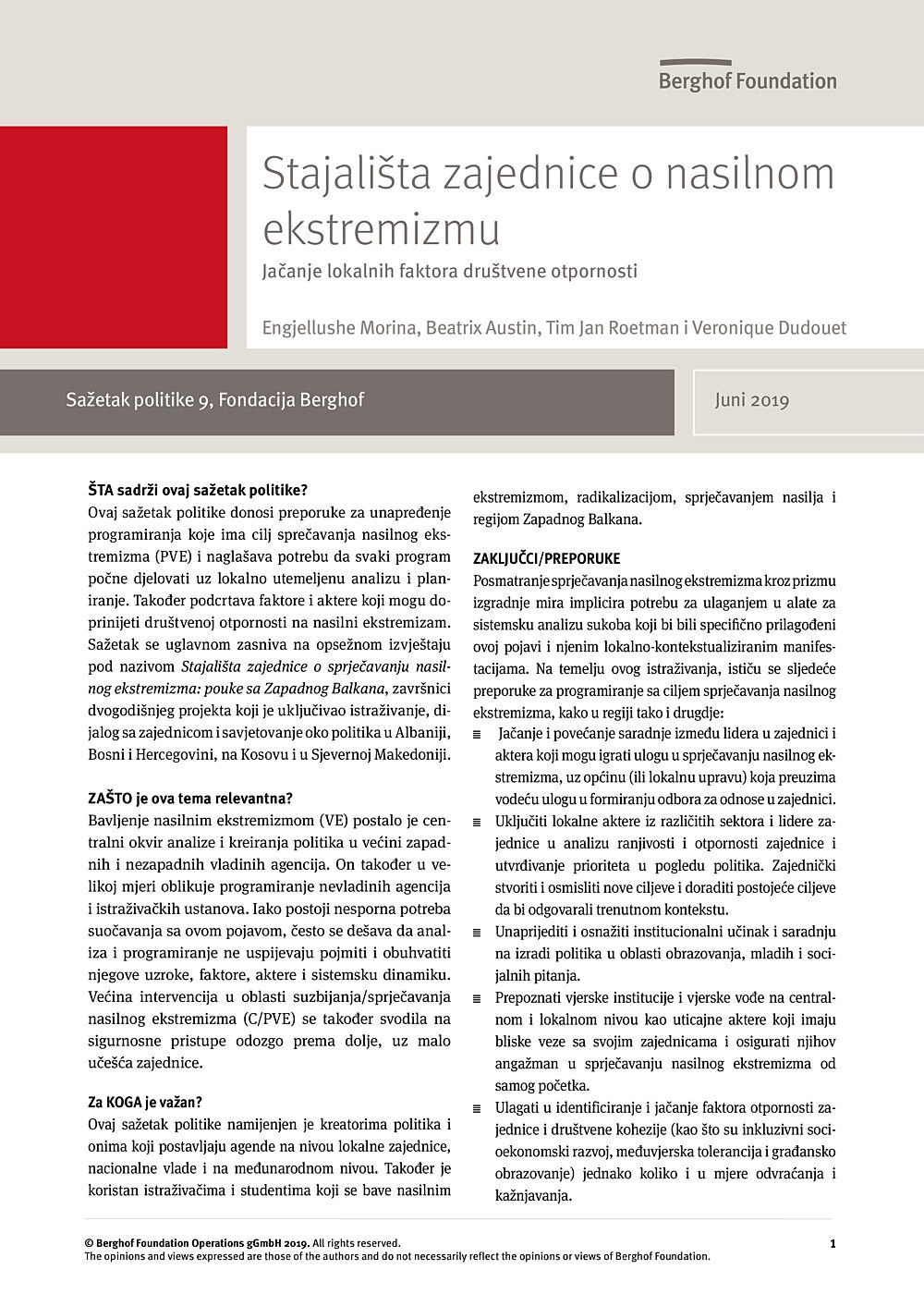
Stajališta zajednice o nasilnom ekstremizmuJačanje lokalnih faktora društvene otpornosti
Ovaj sažetak politike donosi preporuke za unapređenje programiranja koje ima cilj sprečavanja nasilnog ekstremizma (PVE) i naglašava potrebu da svaki program počne djelovati uz lokalno utemeljenu analizu i planiranje. Također podcrtava faktore i aktere koji mogu doprinijeti društvenoj otpornosti na nasilni ekstremizam. Sažetak se uglavnom zasniva na opsežnom izvještaju pod nazivom Stajališta zajednice o sprječavanju nasilnog ekstremizma: pouke sa Zapadnog Balkana, završnici dvogodišnjeg projekta koji je uključivao istraživanje, dijalog sa zajednicom i savjetovanje oko politika u Albaniji, Bosni i Hercegovini, na Kosovu i u Sjevernoj Makedoniji.
- Year2019
- Author(s)Engjellushe Morina, Beatrix Austin, Véronique Dudouet, Tim Jan Roetman